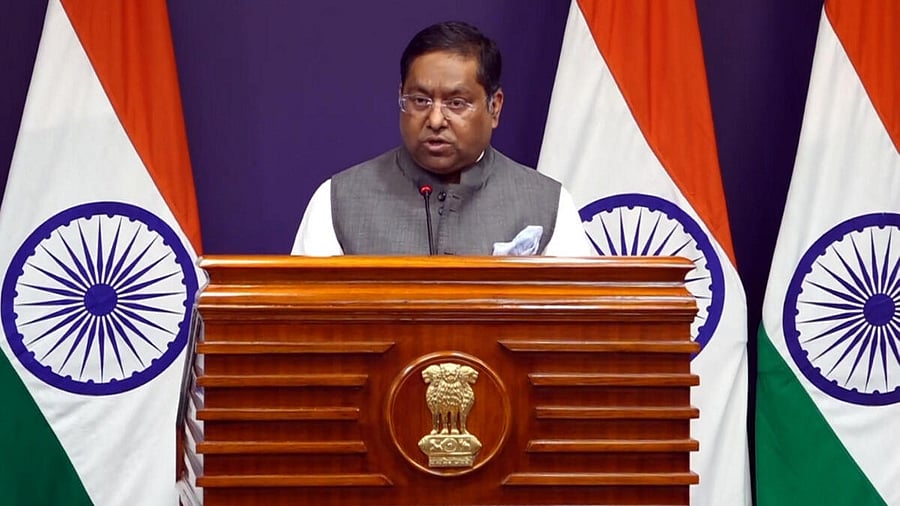
Ministry of External Affairs official spokesperson Randhir Jaiswal addresses a press briefing.
Credit: PTI Photo
New Delhi: Nepal has objected to the latest decision by India and China to restart border trade through Lipulekh Pass, reasserting its claim on the area.
New Delhi, however, rejected the objection from Kathmandu.
The meeting between External Affairs Minister S Jaishankar and his counterpart from Beijing, Wang Yi, in New Delhi on Monday saw India and China agreeing to restart the border trade through the three designated points – Lipulekh Pass in Uttarakhand, Shipki La in Himachal Pradesh and Nathu La in Sikkim.
The border trade through the mountain passes was suspended after the onset of the Covid-19 pandemic in early 2020. With the military stand-off along the Line of Actual Control (LAC) in eastern Ladakh from April-May 2020 to October 2024 casting a shadow on the overall bilateral relations between India and China, the border trade could not be restarted even after the pandemic was over.
As the two sides started making attempts to bring the ties back on track after the end of the stand-off came to its end in October 2024, Jaishankar and Wang decided to restart border trade through all three mountain passes.
Kathmandu, however, on Wednesday, objected to the move by China and India through the Lipulekh Pass, calling it a part of the territory of Nepal.
New Delhi’s relations with Kathmandu had suffered a setback after Prime Minister K P Sharma Oli, during his previous term as the prime minister of the neighbouring country, had ratcheted up the Nepal-India dispute over the Lipulekh-Kalapani-Limpiyadhura area in 2020 – at a time when the Indian Army had been resisting the Chinese People’s Liberation Army’s aggressive moves in eastern Ladakh.
Oli had also got a new map, showing nearly 400 sq. km of India’s areas as part of the territory of Nepal, endorsed by the parliament of the country.
“The Government of Nepal is clear that the official map of Nepal has been included in the Constitution of Nepal and that the map shows Limpiyadhura, Lipulekh, and Kalapani east of the Mahakali River as integral parts of Nepal,” the Ministry of Foreign Affairs of the neighbouring country’s government stated in Kathmandu on Wednesday. It added that Nepal had been urging India not to carry out any activities, such as road construction or expansion and border trade in the area. “Even the friendly nation, China, has been informed that the said area is a part of the territory of Nepal.”
New Delhi dismissed the objection from Kathmandu. “Our position in this regard has been consistent and clear. Border trade between India and China through Lipulekh Pass commenced in 1954 and has been going on for decades,” Randhir Jaiswal, the spokesperson of the Ministry of External Affairs, said in New Delhi. “This trade had been disrupted in recent years due to Covid-19 and other developments, and both sides have now agreed to resume it.”
Jaiswal also said that Nepal’s claims on the areas within the territory of India were “neither justified nor based on historical facts and evidence”. “Any unilateral artificial enlargement of territorial claims is untenable,” the MEA spokesperson said, adding that India continued to be open to “constructive interaction” with Nepal on resolving agreed-upon outstanding boundary issues through dialogue and diplomacy.
Kathmandu stated that the Government of Nepal had been committed to resolving the border issue between the two countries through diplomatic means on the basis of historical treaties and agreements, facts, maps and evidence.
